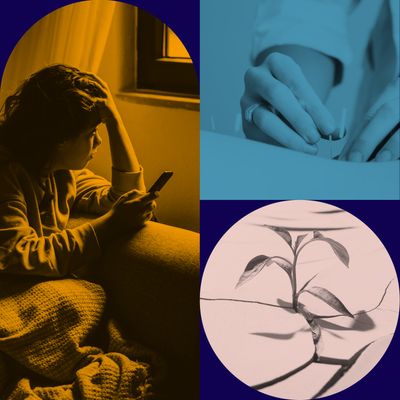
Esther Perel is a psychotherapist, a best-selling author, and the host of the podcast Where Should We Begin? She’s also a leading expert on contemporary relationships. Every other week on the show, Perel plays a voice-mail from a listener who has reached out with a specific problem, then returns their call to offer advice. This column is adapted from the podcast — which is now part of the Vox Media Podcast Network — and you can listen and follow for free on Apple podcasts or wherever you listen.
The Message
In a few weeks, I will be moving back to Massachusetts to open my first acupuncture practice. My biological mother, with whom I have very minimal contact — and always through the internet — messages me from time to time to describe her pain. She’s experienced significant traumas through the course of her life, which affect her physically, psychologically, financially, emotionally. My life has been marked by a lot of opportunities, transformation, and a lot of help from others, and I’ve also worked hard to accept and integrate my own trauma, which includes being born to a meth-addicted mother. As I move toward opening this practice, I feel an increase in what feels like a kind of survivor’s guilt. I’m afraid that this tension will prevent me from ever accepting my own success and ability to thrive. My joy feels intimately tied to how much she suffers.
The Phone Call
Caller: In the morning, I received a message from my biological mother, and she said, “How are you doing this morning? I’m not well. I had a mini heart attack this morning.” It was extremely triggering, and, for whatever reason, I thought of you at that particular moment. Then I just sent a message, a voice-mail.
Esther Perel: And what did you think of me?
Caller: I know your experience with your parents and your parents being Holocaust survivors. When I was 3, in my adoptive family, my father committed suicide. So I went from this kind of crisis of my birth into another crisis. My family, being a family of New Englanders — they don’t really deal with their emotions that well. They tend to go, go, go, and work. So it’s really only been in the last couple years that I have started to look at the degree to which I may have been affected by trauma and how that’s shown up in my body and my experiences with the world around me. Most recently, as I’m getting closer and closer to my own kind of locked-in feeling and my own locked-in sensations, it’s like my biological mother is coming more into view.
Esther: What do you see when you look at her life?
Caller: I see someone who has not had a chance for happiness and caring and love. Someone who’s just grasping for help. I also see someone that I don’t know how to help.
Esther: Meaning?
Caller: I don’t know what to say. I don’t know how to alleviate her pain, her psychological pain, her physical pain, her financial pain. I live at a distance from her.
Esther: Have you been in touch with her throughout your life?
Caller: The first time that we were ever in touch was when I was about 12. She called my home and I happened to be the person who picked up the phone, and she said, “This is your mother.” I really didn’t know how to process that at that time. But ever since, I’ve been periodically in touch with her, primarily through the internet. I’ve never been on a phone call with her, it’s only been through either MySpace or Facebook, and most recently through text. That was something I was really afraid and unsure of. At this point, we’re still more in contact through social media than we are on the phone.
Esther: And when she appeared when you were 12, you knew that you had a biological mother somewhere?
Caller: My adopted mother wanted to wait until I was 7 to officially adopt me so that I’d have some kind of sense of what was happening, but I’ve been with that family since I was 7 days old. And my biological mother was the foster child of the woman who ended up adopting me. So there’s that connection.
Esther: How old was she?
Caller: She was 19 when she had me, but she was mentally unfit to take care of me and essentially the state came and took me. That’s something that really was devastating to my biological mother. I have to describe this: When my biological mother talks to me, it’s usually in this very repetitive script of things that have happened to her. When I first was in contact with her, it would be like a never-ending paragraph without punctuations, like an epic poem. It would be a list of the things that happened to her, including the story of when the state basically came and took me from her arms — and she hasn’t seen me since. My adoptive mother has told me the story where all she had to do was provide a crib, and she would have gained custody of me. I’ve been with this adopted family since. So when I speak with her, it’s like I am encountering her scripts, her trauma, and as time has gone by — especially in the last couple of months — her health seems to be deteriorating even more. And that’s usually the topic of the interaction. Of course, it’s interspersed with, “I love you, you’re the best thing that ever happened to me, I’m so proud of you,” and that’s meaningful. But it’s her continuing struggles and her suffering that often make it difficult for me to feel like I can enjoy my life.
Esther: You have a feeling that your joy, your success, your aliveness, sits on her suffering, troubles, and challenges.
Caller: Yeah. She’s never made me feel bad for the life that I have.
Esther: It doesn’t come from her.
Caller: Yeah, exactly.
Esther: So you said part of what drew you to speak with me is that maybe I have some understanding of survivor guilt — that is a word you have sometimes tried on for size on yourself, that you experience. I need to do something for her so that I pay off my debt, so that I feel more deserving of what I have, so that I don’t feel so selfish that I have all these wonderful things while she struggles every day. I owe her. Or is it a question? What do I owe her? How much do I owe her? What makes a mother? The one who raises me or the one who had me?
Caller: Yeah. I’d say the biggest place where this comes out for me is through my work. I’m an acupuncturist, and it’s taken me a long time to really get to a place of confidence and comfort in this practice, mainly because it’s been so existentially triggering, working with people in their suffering, in their health. It has really put me in touch with my own pain and my own story, and it’s also helped me heal a lot of that as well. But it’s my confidence and my ability as an acupuncturist, it really comes down to how effective am I in seeing these people and being with them and helping them. So being in a healing profession, encountering my mother’s suffering, it’s like I feel some sense of failure in my professional life, which connects me deeply to my sense of self and my capability and my ability to exist and to live and to thrive successfully.
Esther: Right, but just so I follow you: If I can’t help the patient, it puts into question my entire professional identity because on some level, while I am not helping my mother, I feel that my deep intuitive understanding of her suffering and mine should make me able to help any patient who walks into my office. If I am the perfect healer, I know that I’m not the lifelong victim.
Caller: Right.
Esther: Is that what you’re saying?
Caller: Yeah.
Esther: If I can heal anybody who comes to me, then I know that I am not the struggler that I come from or that she is.
Caller: Right.
Esther: If I can’t heal you, then the existential crisis is that I instantly worry that I can enter the other camp. That is separate from the survivor guilt — I feel like I can’t just experience the joy, the success, the opportunities that life puts in front of me, knowing that she’s struggling to that degree. And then I ask myself, what do I owe her? How much should I help her? What is the boundary? But that’s two separate things, yes?
Caller: Yeah. I would add that I’ve felt similar things with my adoptive mother as well. I only started my practice about five years ago, and since then she’s had a hip replacement and a knee replacement, and this year she’s turned 80, which really prompted my return back to where I’m from, to be closer. She’s in the winter of her life and I want to have those experiences with her. But there’s also this fear that I have that when my adoptive mother dies, that my biological mother will still be living. The only way I can describe it is that she’s my mother. My adoptive mother is my mother. There’s a sense that I don’t want another mother. I’m often feeling with my biological mother — I hate to admit it — but I sometimes wish that she didn’t exist. On top of that, the suffering that my biological mother goes through is very imminent for her. When she is in a crisis, it’s very big. It’s very loud for her. And she’ll say things like, “I want you to know that I told the nurses and the other medical staff that I have a DNR, and if I go under, I don’t want them to resuscitate me.” She doesn’t want to live. That’s really hard to hear. It’s really hard to manage my adoptive mother nearing the end of her life. It’s also difficult to manage the fact that my biological mother doesn’t want to live and that she’s in a lot of suffering.
Esther: And you too.
Caller: So when I say it’s hard to find joy or success, it’s because these people who gave me life — my biological mother gave me the gift of life and I’m so grateful that she did. It’s so hard to convince her that that’s enough, that the fact that I exist was enough of a gift.
Esther: I don’t know if you heard when I inserted, “My adoptive mother is in pain, my biological mother is in pain,” and I added, “and so are you.” And I would hope that you didn’t become an acupuncturist or a healer to numb your own feelings. Your biological mother has often not been a mother. She wants you to parent her. Your adoptive mother has been very mothering and giving and has never asked for much from you to take care of her. It’s a complicated situation that very few people know, but you’re not alone. You live between pain and pleasure, between life and death, between people who take and people who give. And that gives you a very unique perception.
Caller: Yeah, my experience of my practice has evolved a lot in the last five years. I would say it’s actually helped me understand how to feel in a really powerful way. I can have my feeling and I can witness another person’s feeling, and so I think in the long run it’s helping me find acceptance of the things that I’ve experienced and the things that my families have experienced and continue to experience. It can just be so hard in the moment, with my biological mother mostly. I know how much, how much she suffers and I just want peace for her and it’s like every …
Esther: Do you want to be involved with her? That’s your central question, right?
Caller: It is.
Esther: Your question is not what you wish for her or what she wishes for herself. It’s: Do you want to enter that arena? Do you want to be involved? Do you want to fight for her? Do you want to become her proxy? Do you want to be her guardian? Do you want to administer acupuncture onto her. Do you want to take care of her? And that’s when you hope to invoke your compassion for her that she could not take care of you. But there may be another part of you that is also upset and angry that she never got her act together. So it often brings up helplessness, compassion, and anger — and many other feelings probably, which other ones that I’m not mentioning?
Caller: Confusion, really, you know, deep existential confusion.
Esther: So how have you confronted your helplessness toward your mom? Because survivor guilt accompanies “I couldn’t save you. I couldn’t change your life.” I don’t even know if you tried. But in any case, there’s a sense that it was so all-encompassing.
Caller: This is really the core question. For me it’s how can I have a sustainable connection with her? When I go to the place of being physically in her life, it creates a lot of fear.
Esther: Of?
Caller: Of … the schism of who I am, the life that I’m living. I don’t know how I could know her.
Esther: Have you ever seen her after … that first time?
Caller: No. I’ve never met her.
Esther: You’ve never met her in real life. But even without seeing her, is your fear that if you get involved, you’ll never come out of there?
Caller: Yes.
Esther: That it is an insatiable, infinite set of needs and problems and struggles, even if you never meet her, if you just enter her in a bureaucratic way.
Caller: Yeah, and that’s to some degree already happened. The interactions that I have with her just through her words are … when I have that acute experience with her, I freeze. I can’t … And the other piece too is, a couple of weeks ago, when she messaged to tell me that she had had a mini heart attack — which was the fourth she’s had in the last four years — I had this sense that, even if I were to know her, if I were to meet her in person, even the joy of that, for her, could be detrimental because of the depth of that unexpressed emotion, and the so many years …
Esther: But you have refused to see her all those years?
Caller: No, no. It’s just really a combination of the circumstances. I’ve been living away from Massachusetts for the last 12 years. The other part of it is there’s a certain nature to her, the way that she interacts with not only me but other people because of her trauma and because of who she is. She will have a profile on social media and then she’ll delete it. Then she’ll come back and then she’ll go away and then she’ll come back and she’ll go away. So there’s been a pretty prominent inconsistency of whether she’s in contact or not. When I was probably 16, I looked up her name on MySpace and found her and she had a photo of me, from my page. There’s always been these digital interactions that have been fraught with a sense of: Who are we? What are we wanting? What is the nature of our relationship?
Esther: I will tell you one thing. There is one piece that stands out in front of me immediately. The same way that you say, “She gave me the gift of life,” I could imagine her saying, “This is the one thing I put on this planet that didn’t turn sour, that blossomed.” I mean, she didn’t necessarily help you with it, but at least something came out of her that became beautiful.
Caller: You know, I’ve said that to her several times …
Esther: No, but she should be saying that to you.
Caller: Yeah. But when we go into that space, she goes into the story of the tremendous amount of guilt and pain that she feels that she wasn’t the one who got to raise me.
Esther: And you would like to say to her, “I’m so glad you didn’t.” I mean, that’s not what you would say, but that’s a part of what you think?
Caller: Pretty much. To a degree, I’ve said that to her not in such negative terms. I’ve said, “You know, the life that I ended up having has probably been the best that it could have gone. I’m so grateful for that. And you did that — your giving me up gave me that opportunity and I’m so happy where I am in my life.”
Esther: So you turn it into gratitude.
Caller: I turn it into gratitude.
Esther: So is that your primary dialogue with guilt?
Caller: Guilt with her?
Esther: What you call the survivor guilt. “How am I going to savor my life, to experience my joy, my relationships, my practice, without constantly feeling that I can’t fully settle into it because I’m being sucked on the other side.” Is your question, Shall I meet her? Is your question, How do I stay anchored in my life without experiencing this pull constantly as if I owe her when a part of me feels I don’t, and another part of me feels grateful of the life I had, and so therefore I feel I should. I’m giving you bits and pieces of how survivor guilt talks. It talks to us in certain ways. I don’t know which way it talks to you.
Caller: I think I’ve been able to gain a lot of perspective through my adoptive family, through observing how they dealt with my father’s death and how, despite not being really a family that experiences emotions or deals with emotions that well, they’ve transformed that pain into lives that they’re generally enjoying.
Esther: How many are there? You have siblings?
Caller: I do, I have two brothers and two sisters. I had a third sister who passed away when I was 10. I’m by far the youngest, so when I came into the family, for the most part, I grew up with all of my other siblings having kind of moved out. So my adoptive mother, I came into her life at a very pivotal moment, a few years before her husband died. When I was growing up, it was like I was kind of a new lease on life for her. So we would do a lot of things that she wasn’t able to do with her other kids because she was managing them all the time. I look back on that with a lot of fondness. In the beginning of my kind of processing all of this stuff, we were two survivors clinging to each other — but really now she’s just a great friend and I have so much respect for what she ended up doing with her life. When my father died, she had never had a job. For the most part, she was a stay-at-home mom, and so she had to figure out how to, how to survive. She has so much pride in her children and her life. That goes back to that feeling that I have: She is my mother. She is the mother that I want. And there’s the guilt again. I can feel it back here. It’s like, But my other mother is suffering.
Esther: Give me a snippet of that dialogue between the part that says, “She’s my mother,” and the part that says, “But my bio mother is suffering.” And then what does the other one answer?
Caller: I think the voice really says I wish she would … didn’t exist? I wish she would die. In some way, the conversations I’ve had with her, that sense from her that she in many ways does want to die, that’s the gift.
Esther: But that’s not the point. The point is “I wish I could be with one mother.” For a change, for a short time. Without having to constantly have to justify or have to pay my luck, my redemption.
Caller: Something that comes up a lot is, she has a lot of mental-health issues. I’ve been very fearful of putting myself into a space where those genes could get turned on, you know. I have my own mental-health struggles and my own difficulties as anyone does. But I’m …
Esther: “But I live with this idea that there is inside of me a part that she represents and that I am afraid could get provoked. One is the genes and one is the culture. One is in the relationship, one is in the genes. And that conversation often makes us think there is a deeper layer that is the genetic piece that is invisible but maybe I’m not nearly as far and as different from my biological mother as I think I am. So I don’t want to get contaminated.” And all of this is heightened because you are basically moving back and they are both going to be there. If you see one and not the other, or if you help one and not the other — but you may want to decide to do it in a very differentiated way. You don’t owe the same thing to each person.
Caller: Right.
Esther: You have one person who asks all the time, but doesn’t ask you often “How are you?” So the person who’s going to have to ask you, “How are you?” is you.
Caller: That’s surprisingly difficult. But I will say that in the last week I’ve been working on my office space and it’s the first office that I’ve ever had as my own. And ironically, right down the street, probably 200 feet, there’s a methadone clinic. So it’s kind of like I can exist here and that’s right down the road but I can live a life that I really enjoy, that’s mine, and no one else’s in the same way.
Esther: There’s a part of you that says it, and there’s a part of you that is not fully convinced that you can and that you are allowed to.
Caller: I think that part is a feeling part, something that has yet to be felt. I think a lot of the trauma that I experienced was really early and preverbal, and that was something that’s taken me a really long time to realize. I have to feel it.
Esther: In your body.
Caller: In my body.
Esther: I wish we had more time. I don’t feel like we necessarily have arrived at a destination, but I think we have maybe put some words and clarified some pieces on the road.
Caller: Absolutely. I really, really appreciate your time and your insight.
More From This Series
- ‘How Can I Repair With My Family When They Don’t Celebrate My Identity?’
- ‘How Do I Forgive My Mother for Passing Down Her Trauma to Me?’
- ‘We Moved Away From Family During the Pandemic. Now I Miss That Support.’




